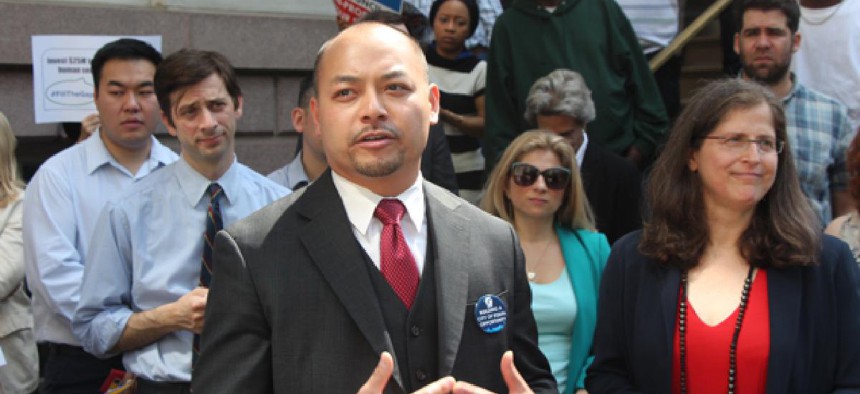Nonprofits call for contract increases to cover administrative costs

Photo: Dan Rosenblum
Nonprofit organizations that serve millions of New Yorkers warned yesterday that their sector is on the “brink of disaster” unless New York City Mayor Bill de Blasio adds $25 million to next year’s budget to accommodate rising administrative costs.
Representatives from at least a dozen groups joined three City Council members at a press conference outside City Hall to urge the mayor to add money to contracts to pay for organizations’ increasing costs. A proposed 2.5 percent increase in the “Other Than Personal Services” (OTPS) budget line – which covers non-staffing costs such as rent, supplies, repairs, technology and health care costs – would affect 3,700 contracts for day care, after-school programs, food pantries, mental health counseling, senior care and homeless shelters.
“It’s unfair that the city is asking us to do this work when we don’t have the resources we need to do the work,” said Councilwoman Helen Rosenthal, chairwoman of the Contracts Committee.
Rosenthal said that all but two of the 51 City Council members signed a letter urging the mayor to increase funding. The budget for the 2017 fiscal year, which begins July 1, is likely to be adopted within the next few weeks.
The city budget passed last year included a 2.5 percent cost-of-living adjustment, and in January the de Blasio administration announced that municipal workers and those working for contracted agencies will earn $15 an hour by the end of 2018. But social service advocates said those changes only emphasized the need to increase the OTPS contract line, so agencies can cover increases in conjoined administrative costs.
Marla Simpson, executive director of Brooklyn Community Services, said costs have threatened two of the group’s “very well-run” programs this year and that it didn’t fill vacant positions because of the financial burdens.
“Rent is not sexy, insurance is not sexy, I get that,” she said. “Two-point-five percent for OTPS: not sexy. But what it means is that when we can’t pay those bills, our dedicated workforce can’t do that job, and that matters.” (Rosenthal interjected to lead a brief chant: “2.5 percent is sexy.”)
One group, identified by the Human Services Council only as a “nonprofit providing children’s programs and services,” faced a 2 percent average annual rent increase in most of its leased properties, a 13 percent annual average rise in health care spending and a doubling of liability insurance costs from 2010 through 2015.
While this agenda item must compete with those of various other agencies and advocacy organizations jockeying for program funding at the end of the budget season, the potential risks of shuttering nonprofits could be particularly devastating across the city, as has been demonstrated recently.
After FEGS Health and Human Services went bankrupt in March 2015, an HSC report stated that 1,900 employees were fired and 120,000 cases representing households receiving its services needed to be transferred, and noted that it would be difficult to find agencies in the sector that could absorb another closing. The report found that underfunding, payment delays and unfunded mandates by government agencies were major drivers of rampant insolvency in the sector. Nonprofits have since been coming to City Hall to voice their concerns and more aggressively advocate for changes. Many of those who spoke yesterday testified last month at a Council oversight hearing detailing how the city’s contracting process jeopardizes groups’ stability.
“We can’t have, as a city government, your organizations on the precipice of going into bankruptcy or going into extreme debt year after year, because you can’t make up the difference and because the funding is not there,” said Councilman Stephen Levin, chairman of the General Welfare committee.
City Hall spokeswoman Karen Hinton said the administration was committed to the nonprofit sector and those it serves. “That is why we have made unprecedented investments in human services, including putting our contractors on the road to $15 an hour,” she said. “We are always looking for ways to strengthen nonprofits and will continue to do so moving forward.”
Wayne Ho, chief strategy and program officer for the Federation of Protestant Welfare Agencies, said the city could also help offer health insurance, a retirement fund for workers, more career pathways and speedier payments, and ensure more city contracts go to groups led by immigrants and people of color.
Other advocates at the press conference included Urban Pathways, the Jewish Association Serving the Aging, Sheltering Arms and the New York Immigration Coalition. Beatriz Diaz Taveras, the executive director of Catholic Charities Community Services, said her group has considered turning down government contracts because they incur too many underfunded costs. Many commended the de Blasio administration’s focus on early education, senior care and reversing income inequality, but said the nonprofits need more money to implement these initiatives.
“I would argue that it starts from the top, that the federal government abandoned us first,” Rosenthal said of the lagging funding. “And it’s trickled down and the city has done the best it can to keep up.”
HSC Executive Director Allison Sesso said organizations, just like their clients, are living “payroll-to-payroll.”
“These services are on the brink of disaster right now,” she said. “I don’t know what else to say about it. We’re raising the red flag and spinning it around and screaming, and we’re not really being heard except for today, and by a few.”
NEXT STORY: Spotlight: Nursing Homes